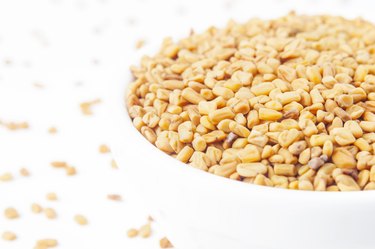
Although fenugreek is commonly used in cooking, it also has long history of medicinal use and has been studied for the treatment of various conditions, including high cholesterol and diabetes. Preliminary scientific evidence also suggests that fenugreek may have beneficial effects on your kidneys, although human clinical trials are still needed to learn how well it works. As with any supplement, consult with your doctor before using fenugreek to improve your health.
Chemical Damage
Video of the Day
Early scientific studies have supported the protective effects of fenugreek against damage to the kidneys caused by chemicals. A study published in the journal "Human and Experimental Toxicology" in 2010 tested the protective effects of fenugreek against kidney damage in laboratory animals exposed to a pesticide called cypermethrin. Results showed that treatment with a 10 percent water extract of fenugreek for 60 days returned kidney function to near-normal levels, suggesting that fenugreek provided protection against pesticide-induced toxicity.
Video of the Day
Kidney Stones
Fenugreek may protect against the development of kidney stones, according to a laboratory study published in "Phytotherapy Research" in 2007. Fenugreek was given to laboratory animals to prevent the formation of calcium oxalate kidney stones. Results showed that animals who received fenugreek supplementation had significantly less calcification in their kidneys and significantly less total calcium in the kidney tissue as compared with untreated animals. The authors concluded that fenugreek may be useful in the treatment of kidney stones.
Kidney Oxidative Stress
Oxidative stress is a condition in which your antioxidant levels are lower than normal and may contribute to the increased risk of cardiovascular disease in people with chronic kidney disease. According to a study published in the "Indian Journal of Physiology and Pharmacology" in 2001, fenugreek supplementation in diabetic laboratory animals increased the levels of antioxidants in the kidney and decreased oxidative stress. Fenugreek may, therefore, play a role in preventing diabetic kidney disease.
Considerations
According to DrugDigest.org, fenugreek usually causes few side effects, but you may occasionally experience mild intestinal gas and diarrhea. If you take fenugreek in large doses for a long period of time, or with your diabetes medicines, it may make your blood sugar levels too low. Avoid fenugreek if you are pregnant or breast-feeding or if you are allergic to similar plants, including peanuts.
- PaloAltoMedicalFoundation.org: Fenugreek
- Human and Experimental Toxicology: Aqueous Extract of Trigonella Foenum Graecum (Fenugreek) Prevents Cypermethrin-Induced Hepatotoxicity and Nephrotoxicity
- Phytotherapy Research: Prophylaxis Effect of Trigonella Foenum Graecum L. Seeds on Renal Stone Formation in Rats
- Nefrologia: Study of Oxidative Stress in Advanced Kidney Disease
- Indian Journal of Physiology and Pharmacology: Restoration on Tissue Antioxidants by Fenugreek Seeds (Trigonella Foenum Graecum) in Alloxan-Diabetic Rats
- DrugDigest.org: Fenugreek
- National Center for Complementary and Alternative Medicine: Using Dietary Supplements Wisely
Is this an emergency? If you are experiencing serious medical symptoms, please see the National Library of Medicine’s list of signs you need emergency medical attention or call 911.